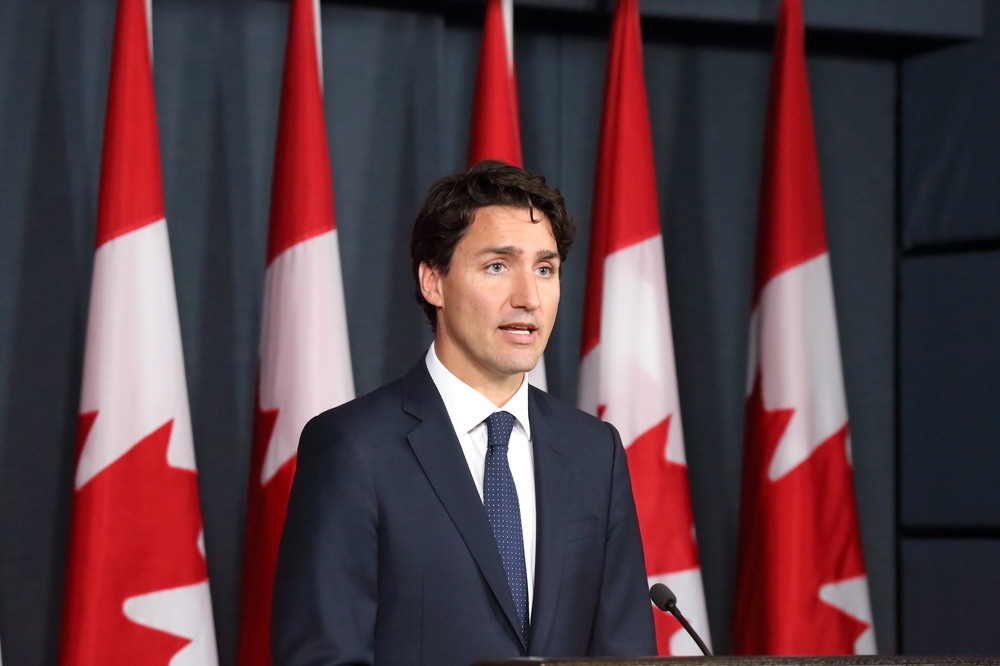
OTTAWA — The political shadow of Doug Ford loomed large over the pre-debate campaign trail Monday as the Liberals kept lumping the Ontario premier together with Andrew Scheer, while the Conservatives did their best to pry the two apart.
Front-runners Scheer and Liberal Leader Justin Trudeau — deadlocked in the polls, by most accounts — made brief appearances in Ottawa before joining their four other foes in making final preparations for tonight’s televised English-language debate, the first such occasion to feature all six leaders.
Trudeau joined a group of Ontario teachers in a bid to highlight ongoing tensions between the province’s education workers and the Ford government — tensions that eased ever so slightly the night before when a last-minute agreement saved parents across the province from a potentially disruptive strike.
Ford’s cuts to services such as education have made him unpopular with voters and a drag on federal Conservative fortunes, observers say. Indeed, the premier’s absence from the Scheer campaign became all the more glaring over the weekend when Alberta Premier Jason Kenney glided in to pitch for Scheer in Toronto, including in Ford’s home turf of Etobicoke.
Trudeau has been trying to take advantage, linking Ford to Scheer every chance he can. The premier will oppose and interfere with Liberal efforts to reduce child poverty and increase federal child benefits, Trudeau said, warning Scheer would only make matters worse.
“Right now we’re in an election where the option is to double down on Conservative approaches, which always cut services, looks for austerity and gives tax breaks to the wealthiest instead of to everyone else,” he said.
Scheer, who’d much rather not talk about Ford, called Trudeau’s photo op with teachers a “disgusting” attempt to politicize education.
Meanwhile, his party carefully tried to set itself apart from Ford on at least one issue that has been particularly troublesome for the Ontario leader: autism.
Alberta Conservative Mike Lake issued a written statement saying the Conservatives would establish a national autism strategy with $50 million in funding over five years. Scheer, in Ottawa to promise free admission to Canada’s national museums, breathed nary a word about it.
Lake, whose son Jaden was diagnosed with autism when he was two years old, is a well-known global advocate for autism awareness and treatment.
Ford was forced to backpedal in July after his government faced a massive backlash over his plan to rejig funding and give a capped amount directly to parents each year, rather than providing funding to service providers directly with no cap per child.
The issue chased Scheer directly onto his own campaign earlier in September, when a mother approached him while door-knocking in Ford’s Etobicoke area, to ask him to help her child after a northern Ontario treatment program was cancelled due to cuts.
The announcements, however, were just the warmup act for Monday’s main event: a six-way debate confrontation, two weeks out from election day, in a campaign that has so far failed to conjure up much in the way of political momentum or public attention.
Trudeau is likely to spend much of the night on the defensive, facing attacks on his record from all sides.
For Scheer, it will be the first time he shares the stage with Maxime Bernier, who left the Conservatives in 2018 to start up his own People’s Party of Canada. Bernier was not invited to either the debate sponsored and hosted by Maclean’s magazine during the first week of the campaign, nor last week’s French-only debate on TVA in Montreal.
The Conservatives appeared all day to be leading up the debate with a plan to go after the Liberals for a secret plan to tax profits on home sales made within one, two or three years of purchasing. A new website and multiple tweets to that effect were met by the Liberals with a press conference where Liberal Steven MacKinnon reiterated that Trudeau had kiboshed the proposal, which was suggested in 2018. The Conservatives responded saying MacKinnon had “confirmed” the plan, even though he had said the opposite.
Bernier, whose success depends on wresting disgruntled voters away from the Conservatives, is a wild-card populist whose presence is expected to introduce an element of unpredictability to the proceedings. Scheer, whose performance in the TVA debate has been widely panned, sounded unconcerned.
“That changes nothing for me, because I am always there to replace Justin Trudeau,” he said.
NDP Leader Jagmeet Singh and the Green party’s Elizabeth May, meanwhile, could also find themselves in each other’s sights as they battle over who will emerge Oct. 21 as the third party on Parliament Hill — a position long held by the New Democrats.
May has been doing her best to parry an NDP narrative that her candidates are opposed to abortion, but that got a little harder Monday with word that Marthe Lepine had been “removed” as the candidate in an eastern Ontario riding for “views about abortion that did not align with (Green party) policy.”
“The Green party will always fight for access to timely, safe, legal abortions,” communications director John Chenery said in a statement. “It recently came to light through social media posts that Ms. Lepine does not support this position so she has been removed as a candidate.”
As for Yves-Francois Blanchet of the Bloc Quebecois, he will enjoy the least amount of pressure, having little to gain or lose in front of a national audience primarily of English-speaking Canadians. The stakes for the Bloc leader will be substantially higher during Thursday’s French debate.
This report by The Canadian Press was first published Oct. 7, 2019.
— With files from Lee Berthiaume